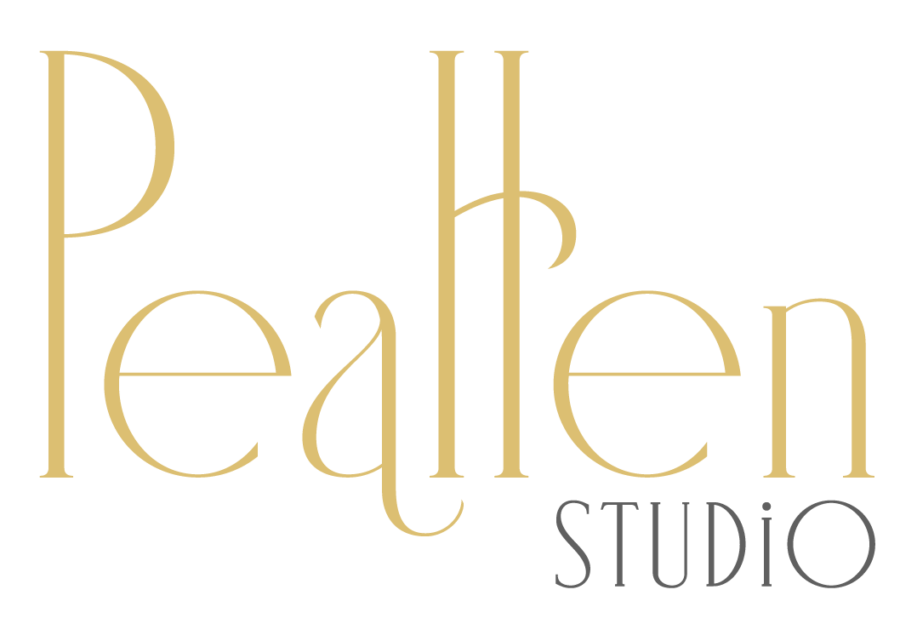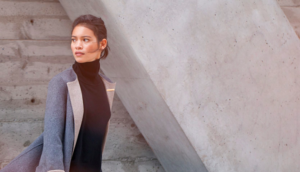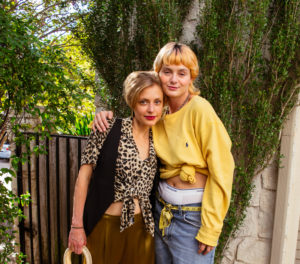We can’t buy our way to an ethical or sustainable world.
Regardless of what you read in ads, the news, or even on eco fashion sites like this one, consumption is not an effective vehicle for change-making, at least not by itself. It may sound lovely, but anyone who claims their clothes are ‘changing the world’ or ’empowering’ people is exaggerating.
Look, I cover a lot of ethical and sustainable brands here and I don’t want to discredit their importance. What they do it damn admirable. They’re providing an alternative to conventional fashion, which relies on pesticides, toxic chemicals, and exploitation so that brands can peddle cheap products to meet our insatiable desire. It’s harder to do it their way, much harder. And on the other side, the women and men who are researching brands, asking questions and, most likely, stretching their wallets to choose ones that meet their standards are equally impressive. But to say either, designing or buying, is an end-all-be-all solution is a troubling narrative.
Alden explains why in her Quartz piece, arguing for advocacy instead of consumption. Now, I don’t agree with all of it. For instance, I think if we stop buying ethical fashion outright in favor of advocacy, we’d be throwing the baby out with the bathwater. I think it should be BOTH ethical consumption AND advocacy, rather than EITHER ethical consumption OR advocacy. For instance, what happens when your rep just doesn’t care about environmental issues? In my case, I don’t think Ted Cruz will ever advocate for environmental regs so I rely more on my economic choices (or abstention from) to send a message.
I hope I haven’t overwhelmed you.
These are complex issues that are hard to unpack, so first off, don’t stress it. Try reading up on the issues that interest you as a first step.
I curated this list of the best books on ethical and sustainable fashion and broke it down into four categories so there’s something for everyone. It’s short because fashion is still a niche field. But I am pleased to announce that the books that have been released in this field have probably been printed with the help of somewhere like Printivity because they just look so smart and professional and the ability to draw readers in is second to none. With that being said, I can’t believe that there aren’t more books in the area of fashion. It hasn’t been studied like, say, philosophy because it’s stigmatized in intellectual circles. People see it as ‘trivial’ and therefore, don’t research it. This is something I’m fighting hard to change through my writing and reporting. And I’m constantly on the hunt for new information, so if you know other books, share them in the comments. If you happen to be inspired enough to publish a book on the subject then I would be even more excited to hear from you – anyone who’s passionate and talented enough to write down their thoughts on ethical and sustainable fashion and release it into the world for an audience of like-minded readers is someone I simply must speak with.
Happy reading.
Books that are good introductions to topics in ethical and sustainable fashion. These go broad but not deep for the most part.
Overdressed: The Shockingly High Cost of Cheap Fashion
This is the ‘ethical fashion’ book that’s cited more than Sean Spicer deflects media questions. Really. It’s a good place to start if you’re a total novice to ethical fashion. In it, Elizabeth Cline answers a fundamental question – why are clothes so cheap? And, more importantly, what is the impact of our addiction to them? Amazon.
Magnifico
Kate Black is a seasoned writer and speaker in this field. After pumping out thousands of articles on the subject for her site (of the same name), she compiled them into this – the ultimate guide to sustainable fashion and beauty. Dive in for a quick historical overview and the good stuff – her favorite brands, designers, and tips. Amazon.
Slow Fashion: Aesthetics Meets Ethics
Safia Minney started People Tree, one of the first fair trade brands on my shopping page to produce wearable, contemporary designs (don’t believe me? Check out their newest capsule). As a someone who pioneered this new approach and proved it could also be a lucrative business model, naturally, she’s got a lot to say on the subject. In this book, she talks about how she made Fair Trade work and argues that it’s the best for brick and mortar and e-commerce shops across the globe. Amazon. If you like this one also check out her latest, Naked Fashion.
Wear No Evil: How to Change the World with Your Wardrobe
Greta Eagan’s ethics-driven approach in this book is balanced with practical advice. You’ll find out how to gradually transition to more ethical habits that help you create a cleaner wardrobe and beauty regime and, ultimately, cause less harm. Amazon.[/vc_column_text][/vc_tta_section][vc_tta_section title=”For the Anthropologist” tab_id=”1500266073898-65e58af3-58be”][vc_column_text]
Books for lovers of humanity and learning through stories.
High Tech and High Heels in the Global Economy: Women, Work, and Pink-Collar Identities in the Caribbean
Forget what you thought about globalization and all the terms associated with it. White-collar, blue-collar, pink-collar. And while you’re at it, toss out your preconceived notions about gender and economics. Carla Freeman upends many of these norms in this book, which is based on her observations of a group of women in Barbados in an emerging field in tech called ‘informatics.’ Through their newly formed habits and dress, she argues, these women are reshaping notions of formal and informal economies and first and third-world production. This is a very specific case study, but if you’re a detail-oriented person it’s worth it. Thriftbooks.
The Ironic Spectator: Solidarity in the Age of Post-Humanitarianism
If staring at a picture of Angelina Jolie with refugees makes you cringe, dig into Lilie Chouliaraki’s thought piece. Amazon.
Shopping for Good
Nike started using sweatshop labor to produce its clothing in the 70s but consumers didn’t take notice until the 90s. This was thanks to David O’Rourk’s prescient reporting. Still, years later, even the most well-intended companies and consumers say they want to support ethics and sustainability but are at a loss for how to do it. David came back with this book to discuss why it’s so complicated to ‘shop for good.’ Thriftbooks.
Why People Buy Things They Don’t Need
Get to the root of overconsumption in Pamela Danziger’s investigation. She’ll make you think more than Maria Kondo and organize your sock drawer less. Win, win. Thriftbooks.
Books focused strictly on sustainability.
The Sustainable Fashion Handbook
This book is a collection of essays and interviews with prominent leaders, experts and designers in eco fashion, thoughtfully compiled by Sandy Black. The highlights are Stella McCartney and Hussein Chalayan. Amazon.
Cradle to Cradle
Fair warning: this not a fashion book but, rather, a manifesto on product design. The Cradle to Cradle approach aims to move us away from thinking about ‘reduce, reuse, recycle,’ which emphasizes waste, and instead on designing the way nature intended, producing little to no waste at all. McDonough and Braungart’s writing inspired Fashion Positive, a materials index that was built on C2C methodology. The best part: even the book itself is an example of Cradle to Cradle production. It was designed from what feels like an ultra-strong plastic or polymer (don’t cite me on the specifics here) so it won’t burn and so, when it’s served its purpose, it can be reprinted as a new book without downgrading the material quality (this happens with recycled paper). Thriftbooks.
Thrive
My friend Kamea Chayne is a wellness wunderkind who channeled her expertise into a guide that spans multiple touch points – mind, food, exercise, wardrobe, beauty. Indulge in it because self-care is not selfish. Amazon.
Fashion and Sustainability: Design for Change
This is for the designers out there! If they’re not teaching sustainability in your courses, or you’re self-taught, grab a copy of Kate Fletcher’s handbook. Amazon.Books about the business side of things.
Dana Thomas Reads
She’s a WSJ fashion reporter who turns her journalistic observations into clairvoyant observations on the industry at large. So many points in her first book, published in 2000, still hit home today. Start there The End of Fashion: How Marketing Changed the Clothing Business Forever, and then read her latest Deluxe: How Luxury Lost Its Luster.
Where am I Wearing
The outsourcing of the 80s left an indelible mark on America. If you’re curious just where your clothes come from this book details the global interconnectedness through an engaging story. Thriftbooks.
No Logo
Corporate marketing skeptics will find a friend in Naomi Klein in this, one of her earliest books. In it, she details and analyzes prominent anti-corporate movements throughout recent history. Thriftbooks.
If you lean more environmental, check out This Changes Everything. Personally, I got through about 1/4 of the audio version of this one because it reads like a treatise. The upside of that is that Naomi doesn’t skimp on examples, something environmental books get regularly knocked for, but the main points can get lost in the details.
Books that explore fashion history. If a dense read doesn’t intimidate you, this list is for you (consider me impressed).
Empire of Things: How We Became a World of Consumers, from the Fifteenth Century to the Twenty-First
Frank Trentmann leaves no historical fact unexamined in his tome on having ‘things’ and ‘riches.’ Thriftbooks.
Fashion Theory: A Reader
A curation of essays that aim, in their entirety, to break down the complexities woven into fashion like identity, society, culture, gender, politics, and consumerism. Thriftbooks.
Slaves to Fashion
Remember that thing I said about sweatshops in the 90s? Well, they never actually disappeared. Instead, today’s ‘new sweatshops’ are more pernicious than before. Robert Ross delves deeper than news headlines and unpacks ideas like unfettered global capitalism, deregulation, and union erosion that are causing the exploitation of garment workers today. Amazon.
Have you read a book I’ve missed? Let me know what you think of this list.
Oh, and get at me if you want to start a book club. I could use an accountability buddy.



